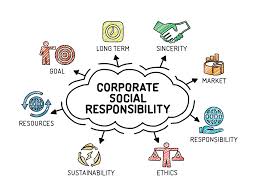Social responsibility has become an integral part of modern society, shaping how individuals, organizations, and governments approach their roles in fostering a sustainable and equitable world. This concept revolves around the ethical obligation to contribute positively to society, addressing social, economic, and environmental challenges. As the world faces unprecedented challenges, such as climate change, inequality, and global health crises, social responsibility has taken center stage in discussions about the future of humanity.
The Essence of Social Responsibility

At its core, social responsibility emphasizes the duty of entities, including individuals and organizations, to act in the best interests of society. It encourages actions that go beyond mere profit-making or personal gain, focusing instead on the well-being of others and the planet. This principle applies to various aspects of life, from corporate practices to individual lifestyles.
Social responsibility is not limited to altruism; it also aligns with long-term sustainability. By addressing societal needs, businesses and individuals contribute to creating a stable and flourishing society, which in turn benefits everyone involved. The ripple effect of responsible actions creates a cycle of positive change.
The Role of Businesses in Social Responsibility
Corporations have a significant role in shaping the landscape of social . The concept of Corporate Social Responsibility (CSR) has gained prominence as businesses recognize their influence on society and the environment. CSR involves implementing policies and practices that prioritize ethical behavior, sustainable practices, and community engagement.
Large corporations often adopt initiatives such as reducing carbon footprints, promoting diversity and inclusion, and supporting local communities. For instance, companies in industries like fashion and technology are shifting toward sustainable production methods to address environmental concerns. These efforts not only enhance their reputation but also contribute to long-term profitability by building consumer trust.
Small and medium-sized enterprises (SMEs) also play a vital role in promoting social responsibility. By supporting local economies, implementing fair labor practices, and engaging in community-building activities, these businesses create meaningful impacts at a grassroots level. Their contributions are often less visible but no less significant in driving societal progress.
The Role of Governments in Social Responsibility

Governments are key players in fostering social responsibility on a larger scale. Through policies and regulations, they establish frameworks that encourage ethical behavior and sustainable practices. Initiatives such as carbon taxation, labor laws, and environmental protection policies are examples of how governments can drive responsible actions.
In addition to regulatory measures, governments often lead by example, investing in public infrastructure, education, and healthcare systems that prioritize the well-being of citizens. International collaborations, such as agreements on climate action, also highlight the role of governments in addressing global challenges through a socially responsible lens.
The Role of Individuals in Social Responsibility
While businesses and governments bear significant responsibility, individuals are equally important in driving change. Personal social responsibility involves conscious decision-making that prioritizes ethical and sustainable actions. This can include reducing waste, supporting local businesses, volunteering, or advocating for social causes.
Consumer behavior has a profound impact on shaping corporate practices. By choosing to support companies that align with their values, individuals can influence market trends and encourage businesses to adopt more socially responsible practices. Similarly, grassroots movements and social media activism have amplified individual voices, creating a collective impact that demands accountability from corporations and policymakers.
Environmental Responsibility as a Pillar of Social Responsibility
One of the most pressing aspects of social responsibility today is environmental stewardship. Climate change, deforestation, and pollution are critical issues that require immediate attention. Social in this context involves reducing environmental degradation, conserving natural resources, and promoting sustainable practices.
Businesses are adopting green technologies, such as renewable energy and eco-friendly production methods, to minimize their environmental impact. Governments are implementing policies that encourage sustainable practices, such as renewable energy subsidies and waste management programs. On an individual level, actions like recycling, conserving water, and reducing carbon footprints contribute to environmental responsibility.
Social Responsibility in the Digital Age

The digital revolution has introduced new dimensions to social responsibility. The rise of social media, e-commerce, and digital communication has made it easier to raise awareness, connect communities, and mobilize depobos resources for social causes. However, it has also brought challenges, such as data privacy concerns, cyberbullying, and misinformation.
Digital social responsibility involves promoting ethical use of technology, ensuring data security, and fostering inclusivity in online spaces. Businesses in the tech industry are under increasing scrutiny to adopt transparent practices and protect user rights. Simultaneously, individuals must exercise digital literacy and responsible online behavior to create a positive digital environment.
The Challenges of Implementing Social Responsibility
Despite its importance, implementing social responsibility comes with challenges. For businesses, balancing profitability with ethical practices can be complex. Short-term financial pressures often discourage investments in socially responsible initiatives, even when they promise long-term benefits.
Governments face obstacles such as political resistance, limited resources, and conflicting interests. Policies aimed at social responsibility may encounter pushback from industries or stakeholders who prioritize economic growth over sustainability.
On an individual level, barriers include lack of awareness, financial constraints, and the perception that individual actions have limited impact. Overcoming these challenges requires education, collaboration, and sustained commitment from all sectors of society.
The Future of Social Responsibility
As the world evolves, so does the concept of social responsibility. The integration of technology, globalization, and shifting societal values will continue to shape how social responsibility is perceived and practiced. Future trends may include greater emphasis on transparency, the adoption of circular economies, and the role of artificial intelligence in solving global challenges.
Education will also play a crucial role in fostering a culture of social responsibility. By incorporating ethical principles into school curriculums and professional training, future generations can be equipped with the knowledge and skills to drive meaningful change.
Collaboration across sectors will be vital in addressing complex global issues. Partnerships between businesses, governments, and civil society can amplify efforts and create innovative solutions that address social, economic, and environmental challenges.
Conclusion
Social responsibility is not merely a moral obligation; it is a necessity for building a sustainable and equitable future. From businesses to governments to individuals, everyone has a role to play in fostering positive change. By prioritizing ethical practices, sustainability, and community engagement, society can address pressing challenges and create a world that benefits current and future generations. The journey toward social responsibility is ongoing, requiring collective effort, resilience, and a shared vision for a better tomorrow.


